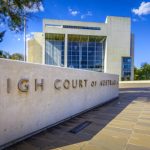High Court Justice Tells Prosecutors to Appeal Lenient Sentences

High Court Justice Virginia Bell ended 2018 on an “incendiary note”, when she publicly implied that some sentences being handed down are clearly too light, and the Crown should be appealing them rather than exercising the restraint that has been applied over recent decades.
The comments were made during a speech Justice Bell gave at the rise2018 Australian Bar Association and NSW Bar Association conference held on 17 November at Sydney’s International Convention Centre.
While the former NSW Court of Appeal judge makes her case somewhat “convolutedly”, she does make clear reference to the 1977 High Court of Australia case Griffiths versus the Queen, in which then Justice Garfield Barwick expressed the view that Crown appeals against sentence should be a “rarity”.
Appointed to the High Court in February 2009, Justice Bell outlined that the function of state courts of appeal is not only to provide guidance on sentencing principles, but also to ensure consistency in outcomes, which in turn enhances public confidence in the “administration of criminal justice”.
She remarked in conclusion that, “The time may have come to recognise that Crown appeals against sentence should not be subject to the rigorous degree of restraint articulated in Griffiths”, suggesting the prosecution should more readily appeal against lenient sentences.
Labyrinthine language
“If Virginia Bell thinks some sentences have become too light – as her recent speech riddle indicates – she should say so directly in plain English,” Civil Liberties Australia chief executive Bill Rowlings told Sydney Criminal Lawyers.
“You should not have to turn upside down, and inside out, to divine the legal thoughts of our High Court luminaries,” he continued.
The long-term civil liberties advocate drew attention to these comments that he believes were delivered by Justice Bell somewhat “convolutedly”. And he added that he was surprised that this “most significant statement” had not garnered more attention.
Mr Rowling further said that his organisation “encourages many more comments from High Court judges, more frequently, in simple language”.
Sentencing appeals in the highest court
As Justice Bell set out in her speech, traditionally, criminal cases only came before the High Court when they involved “some flagrant disregard of the forms of legal process or some manifest grave injustice”.
And the reluctance of the High Court to take on criminal cases was more pronounced when it came to appeals against sentence. In fact, the common view was that state judges understood how to apply the criminal laws in their jurisdictions and the High Court should leave it to them.
However, during the 1980s, the High Court “showed a growing interest in sentencing laws”, Justice Bell explained. And this growth in sentencing appeals heard in the court was due to “the degree to which the sentencing of offenders has been elevated into an arcane science”.
The highest court in the land continues to refuse to take on appeals of sentences based on the grounds of manifest excess or inadequacy. But rather, Justice Bell explained, cases that are taken on demonstrate legal errors in applying sentencing discretion.
A rise in Crown appeals
Justice Bell then went onto assert that the “most striking change” to the work of state and territory courts of appeal “is the increase in the number of prosecution appeals against sentence”. And this is despite the 40-year-old prescription in Griffiths that this should only happen as a rarity.
At the time the Griffiths principles were put forth, Justice Bell said, there were 31 NSW District Court judges. And when these men had served at the Bar, the practice was far more generalised than it is today.
However, last November, there were 68 NSW District Court judges. And the number of serving judges is often augmented by acting judges. And further, the NSW attorney general Mark Speakman had recently appointed seven more judges.
As Justice Bell pointed out the current set of judges has been drawn from a Bar that is highly specialised and has been for the last 30 years. So, with this wide divergence in experience, consistency in sentencing is harder to maintain.
An increasingly inconsistent science
In outlining why the larger amount of state and territory judges with more divergent experience is leading to inconsistent sentencing, the High Court justice paraphrased then NSW Chief Justice Murray Gleeson in 2001’s Wong versus the Queen.
The former chief justice explained that when the pool of judges was relatively small, consistency was easier to maintain, as the “range of penalties for common offences was well known” and any significant departures were easily identified.
“His Honour cautioned that, while the outcome of discretionary decision-making can never be uniform, it ought to depend as little as possible on the identity of the judge who happens to hear the case,” Justice Bell remarked.
And the “incendiary note” that she concluded on was that it might be time for more Crown prosecutions to be brought, implying that the large scope for inconsistencies is leading to sentences that aren’t tough enough.
Rising crime rates, despite the drop
Towards the beginning of her speech, Justice Bell referenced the work of the NSW Bureau of Crime Statistics and Research, which has shown that recently crime rates in this state have been consistently falling and over recent years, they’ve hit a 40 year low.
However, over this time, criminal matters going before the High Court have been on the rise. In 1970, 3 percent of matters determined by court were criminal. In 1990, 19 percent of matters were so. While over the last decade, 23 percent of matters were criminal in nature.
“The High Court should examine why there’s a statistical leap in the number of criminal cases coming before it,” Mr Rowlings said, “and change its practices to deal with the issue.” He also questioned whether these rising numbers were due to state Supreme Courts getting it wrong.
An independent appeals review
“Wrongful convictions in major cases of murder in England are running at 7 percent, according to the Criminal Cases Review Commission (CCRC),” Rowlings went on. The CCRC is an independent statutory body that investigates criminal appeal cases in the UK.
Established in 1997, the CCRC has the power to send these cases back to the courts. It’s reviewed over 23,000 cases. As of November last year, it had referred 657 cases and of them, 648 were appealed and 437 of those appeals were allowed.
Mr Rowlings asserts it’s high time that a similar body such as the CCRC was established in Australia, as our criminal justice system is “virtually identical” to that in the UK. “So, pro rata it’s likely there are 300 people convicted of major crimes in Australian goals tonight who are innocent.”
“Civil Liberties Australia’s analysis suggests – based on statistics – that a CCRC system in Australia would free at least 10 convicted murderers here every year in cases the Supreme Courts are consistently getting wrong,” Rowlings concluded.








